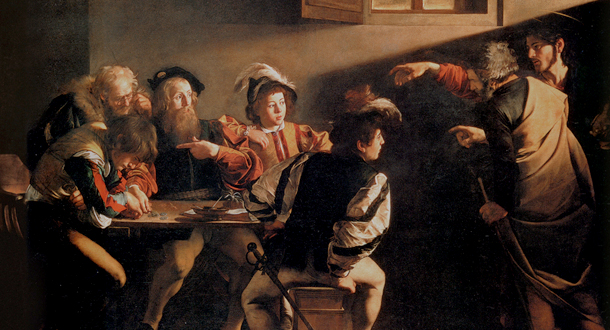
Scripture:
Amos 8:4-6, 9-12
Matthew 9:9-13
Reflection:
The first reading for today is a blistering attack on the rich and powerful who exploit the poor for their own gain. Amos, the eighth-century prophet, is known as one of the most powerful voices in the Bible calling for social justice. Amos did not aspire to this role but was “drafted” by God to do so. In a poignant passage, he exclaims, “I am not a prophet, nor do I belong to a company of prophets. I am a herdsman and a dresser of sycamores, but the Lord took me from following the flock, and the lord said to me, ‘Go, prophesy to my people Israel.”
And prophesy he did! In today’s reading, Amos challenges his fellow Israelites: “Hear this, you who trample upon the needy and destroy the poor of the land!” His indictments of those who exploit the poor have an eerie contemporary quality. He accuses them of reducing the size of the containers for the wheat and fixing the scales and the weights that measure out the food of the poor. They are willing to sell out a poor man “for a pair of sandals.” Such cruelty and injustice, Amos warns in blunt words, will earn the wrath of God, the one who cares for the poor.
God’s care for the poor and vulnerable is one of the most consistent and challenging motifs in the Bible from start to finish. The basic logic is that God is compassionate and just and cares deeply for the well-being of those most vulnerable and in need of support. One recurring biblical expression for this is God’s provident love for “the widow, the orphan, and the sojourner”—each of whom were vulnerable in a strong clan culture that could leave an “outsider” unprotected or supported. A fundamental conviction of the Old Testament is that Israel was a “covenant” people, God promising to protect and nourish them but they, in turn, expected to care for each other. Those made “in the image and likeness of God, were to act with the same sense of compassion and justice characteristic of the God of Israel.
The gospel selection for today from Matthew’s Gospel moves in a similar direction. We hear of Jesus’ call to Matthew to become a disciple: “Follow me.” Immediately this tax collector, despised by some of his fellow citizens, gets up from his “customs post” and follows Jesus. We can presume that Matthew was ecstatic at this recognition by Jesus and invites his Master to dine with him and his friends, identified by Matthew as “many tax collectors and sinners.” This, of course, earns a rebuke of Jesus by his religious opponents: “Why,” they ask Jesus’ disciples, “does your teacher eat with tax collectors and sinners?”
Jesus’ answer echoes the spirit of Amos, “Those who are well do not need a physician, but the sick do. Go and learn the meaning of the words, I desire mercy, not sacrifice [a quotation from the prophet Hosea]. I did not come to call the righteous but sinners.” Throughout the Gospels, Jesus reaches out in compassion to the poor, the lost, and the despised.
The great saints of our Catholic tradition have exemplified this same spirit of compassion and care for the poor, from the iconic medieval Saint Francis of Assisi to the not yet canonized Dorothy Day, founder of the Catholic worker movement. It is also a constant theme of Pope Francis’ teaching and example. In today’s Eucharist the same challenge comes to us.
Fr. Donald Senior, C.P. is President Emeritus and Professor of New Testament at Catholic Theological Union. He lives at the Passionist residence in the Hyde Park neighborhood of Chicago.
